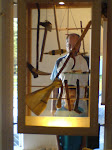Because things in the present triggers old (never felt) pain, maybe we don’t see the here and now for what it truly is, neither betrayal nor the possibilities we actually have here and now. The reason for this is that the present brings old pain up. Bosch writes at page 95:
“Even experienced therapists who undergo Past Reality Integration therapy often experience the depth of their old pain for the first time. As with other clients, these therapists, who have usually experienced other forms of therapy in the role of client, often remark ‘I never knew it was so painful. I knew most of the things that happened, but I’ve never felt how bad it really was.’ Usually they have done a lot of talking about their childhood and crying about it. But crying about childhood is fundamentally different from crying as the child we were then would have, if we wouldn’t have had to repress the pain.”There isn’t only pain but also fear connected to past experiences and both the old pain and the fear are repressed more or less (the pain is always repressed? But we can feel the fear, though, as adults?). When you have met that fear it disappears with time and each time you dare to confront past things it decreases more and more…
Came to think about power- and helplessness again and thus dependency… In adults. Most often, maybe always, these feelings in an adult are about the past.
Jennifer Freyd writes at page 194:
“But what sort of relation is it, and what purpose does it serve /../ If a woman is blind to her husband’s betrayal and abuse she may be serving the immediate survival needs of her children and herself. But often the perception of dependency is the result of past or current psychological manipulation; escape and change may be possible, but the woman may not see those options at all. More often than not, I suspect, an adult’s perception of dependency is erroneous.”We do everything to avoid the pain and maintain/uphold the illusion about the past, with a lot of means: defences (Primary defence, false hope, false power anger, false power denial of needs and maybe more defences) and denial (minimizing, resisting, omitting/blocking, balancing, excusing/justifying).
I also came to think about what Jenson writes about exaggerated responsible taking… To having been forced to this earliest in life because the parents weren’t there, despite it far exceeded (was far beyond) a child’s abilities and capacities and even far beyond its duties. But that was so painful that the latter grown up has to use defences and denial: blaming oneself and ones nature (my fault, stupidness etc.), false hope (I can get what I need, if I only…), false power denial of needs (I don’t care/need anything, I’m fine, nothing is going on etc.), false power anger (It’s your fault, you are no good enough, you are wrong etc.), see page 81 in Bosch.
To engage in our defences therefore is to believe in illusions (denial of how it actually was), because the child we were couldn’t meet the pain of knowing/realizing the truth on its own. And this causes so much misery in adult life, society, the world… Together with illnesses, not just psychological/psychiatric, but also somatic/psycho-somatic, including diffuse aches.
We can use the intellect too to get round pain, resonate ourselves away from it… Intellectualize it, as Miller has written…






























Inga kommentarer:
Skicka en kommentar